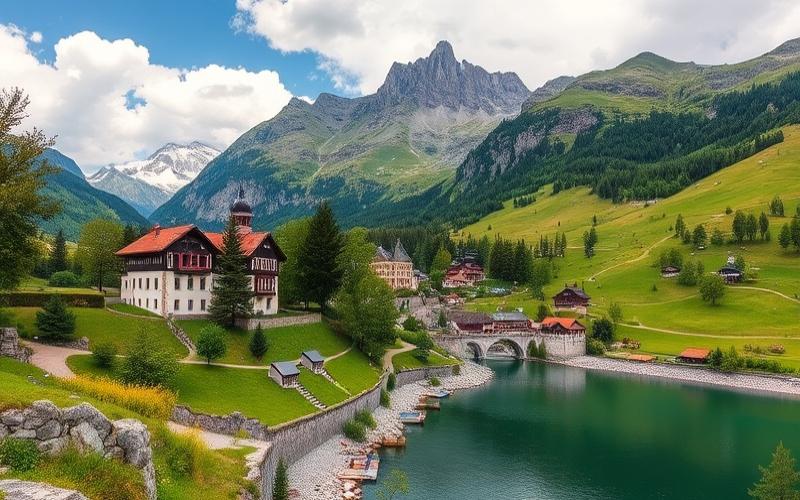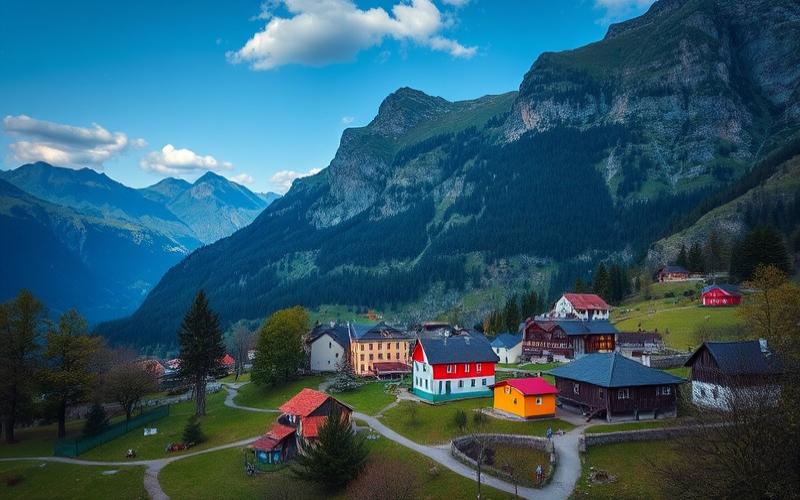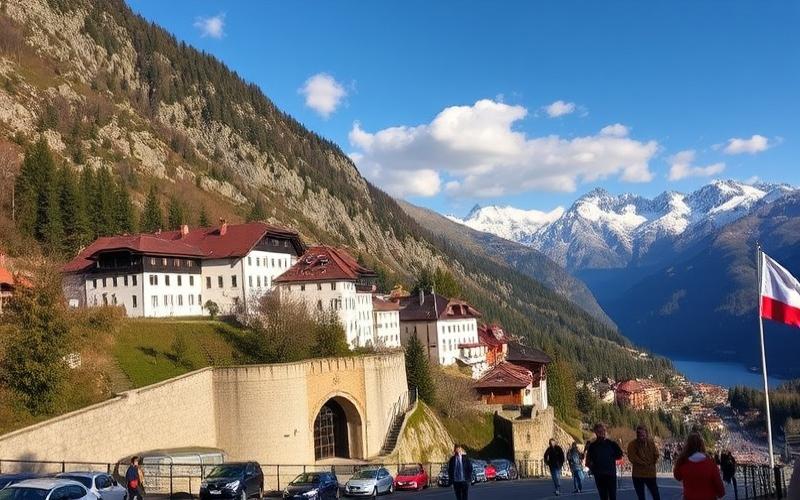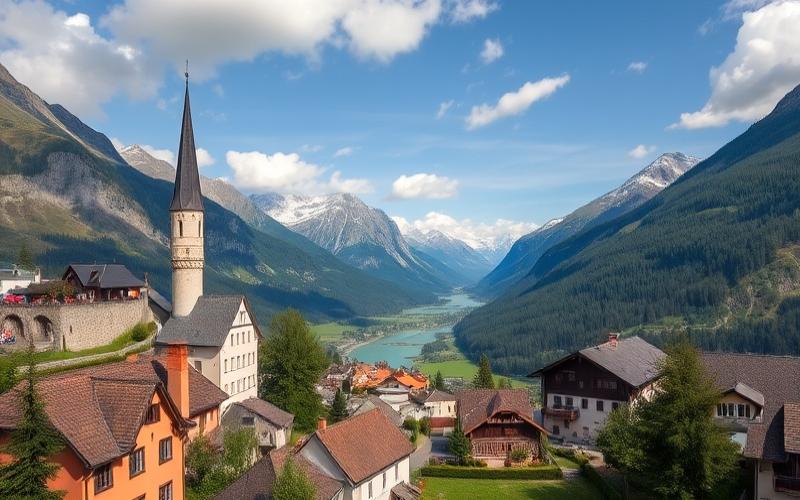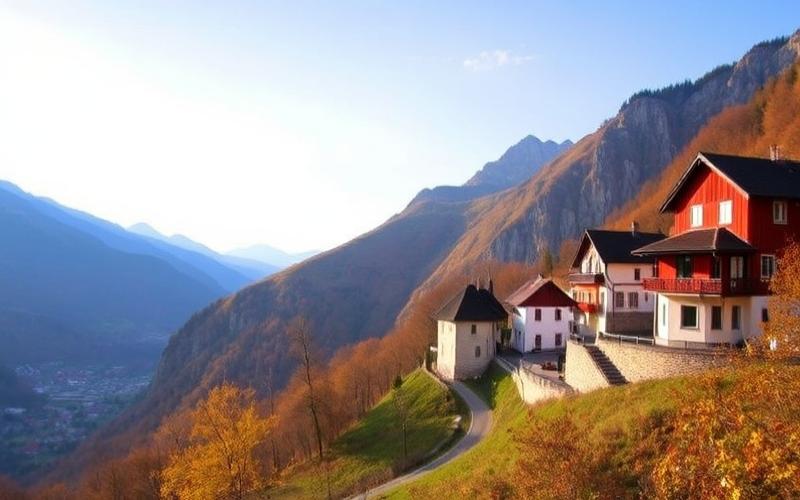
 Published on and written by Cyril Jarnias
Published on and written by Cyril Jarnias
Relocating to Liechtenstein
This small country nestled between Switzerland and Austria offers a unique blend of breathtaking alpine landscapes and rich cultural life. However, for those considering moving there, it’s essential to familiarize yourself with certain cultural differences that might surprise newcomers.
Whether it’s the priority given to community life, the importance of local traditions, or the subtleties of daily interactions, understanding these cultural nuances facilitates harmonious integration into this enchanting setting.
This article explores multiple aspects of life in Liechtenstein, offering essential perspectives for anyone wishing to transform an expatriation opportunity into a memorable and enriching experience.
Decoding Social Norms in Liechtenstein
Punctuality
Punctuality is considered a fundamental sign of respect in Liechtenstein, both in social and professional interactions. Arriving early or exactly on time for appointments is the norm: even minor delays can be interpreted as a lack of consideration or seriousness. For example, during a job interview or when invited to someone’s home, it’s not uncommon for guests to wait outside the door to avoid arriving too early or too late.
Dress Codes
| Situation | Typical Dress Code |
|---|---|
| Business meetings | Formal attire: dark suits for men, conservative pantsuits for women |
| Religious ceremonies | Elegant and discreet clothing; avoid bright colors |
| Daily life | Neat but casual style |
| Festive events | Understated elegance preferred |
An expatriate invited to a national celebration will wear traditional attire if the occasion suggests it (such as during National Day), otherwise elegant but not ostentatious clothing will be appreciated.
Greetings and Gestures
Greetings are generally understated: a firm handshake with direct eye contact in professional contexts. Among close friends or family members, three cheek kisses may be exchanged (a gesture influenced by neighboring countries). Common verbal expressions include “Guten Tag” (Good day) and “Grüezi.” When leaving a meeting or dinner: explicitly thanking your hosts is part of expected customs.
Etiquette for Special Occasions
- Wait for the host to start eating before serving yourself.
- Never place elbows on the table.
- Often bring a small symbolic gift (flowers – except chrysanthemums – local wine).
- During Funkensonntag (Spark Sunday), participating without imposing yourself in the center of the family circle if invited demonstrates understanding of local social spaces.
Social and Professional Hierarchies
Hierarchical respect remains significant. In the professional world, superiors are addressed by their title followed by their name (“Herr Direktor Müller”). Decision-making often follows a top-down logic; however, everyone ensures to preserve collective harmony by avoiding direct confrontation. It’s common for newcomers to wait to be explicitly given the floor in meetings before speaking.
Discretion and Modesty in Communication
Discretion constitutes a cardinal value in both private and public exchanges. Drawing excessive attention to oneself is not well-regarded; it’s better to value the collective rather than individual achievements. In companies particularly, publicly congratulating the entire team rather than a single person highlights this cultural preference.
“Careful observation always prevails over demonstrative expression: listening more than speaking opens more doors in Liechtenstein.”
Language/Dialect Particularities
Standard German is the official language but many speak the local Alemannic dialect among themselves (“Liechtensteiner Dialekt”). Making even basic efforts to learn a few dialect expressions (“Hoi zäma!”, “Wie gaht’s?”) greatly facilitates initial interactions with residents who appreciate this culturally sensitive gesture.
Attitudes Toward Environment/Cleanliness/Public Space
- Strict respect for recycling separation.
- Impeccable cleanliness required in all streets.
- Tacit prohibition against excessive noise especially after 10 PM.
A striking example: carelessly dropping paper on the ground can not only lead to immediate reprimand but also permanently damage one’s image among neighbors – who are very attentive to daily civic behavior.
Key Takeaway:
Integration happens through careful observation, strict respect for implicit codes, and constant valuation of the community over oneself!
Good to Know:
In Liechtenstein, punctuality is paramount and arriving late, even by a few minutes, is often perceived as disrespectful, both in professional meetings and private dinners. Dress codes are generally formal, with a preference for neat attire: shirts for men, dresses or pantsuits for women during business meetings. Greetings are made with a firm handshake and direct eye contact, accompanied by a cordial “Grüezi” or “Hoi.” At the table, waiting for the host to raise their glass before drinking is a mark of politeness. Hierarchy is respected, but relationships remain discreet and marked by modesty; talking about personal achievements is often considered impolite. Local German dialects can be surprising, but using High German facilitates exchanges. Strong environmental awareness encourages respect for public spaces, with a tacit expectation of cleanliness and courtesy.
Immersion in Liechtenstein Traditions and Customs
Liechtenstein’s National Day, celebrated every year on August 15th, constitutes the central event of the Liechtenstein calendar. This day, called Fürstenfest, coincides with the Feast of the Assumption of Mary and symbolizes both religious attachment and national unity around the princely family. Festivities traditionally begin with official speeches at Vaduz Castle, followed by a large citizen gathering where residents and visitors meet to share convivial moments. The day is punctuated by cultural activities, open-air concerts, food stalls highlighting local products, and often ends with a spectacular fireworks display illuminating the alpine valley.
Traditional Cuisine
Liechtenstein’s culinary specialties reflect strong alpine and rural influences. Among emblematic dishes consumed during celebrations or family gatherings:
- Käsknöpfle: fresh egg pasta served with plenty of melted cheese.
- Ribel: sweet or savory crispy polenta made from corn semolina.
- Hafalaab: rustic soup garnished with homemade dumplings, typically enjoyed during winter family meals.
- Torkarebl: comforting dish between thick porridge and dumpling, traditionally accompanied by tart elderberry jam or simply served for breakfast.
- Asparagus appetizers, potato röstis, or cheese toast are also appreciated during special occasions.
| Dish | Main Ingredients | Typical Occasion |
|---|---|---|
| Käsknöpfle | Fresh pasta, cheese | Family gatherings |
| Ribel | Corn semolina | Breakfast |
| Hafalaab | Broth, wheat/corn dumplings | Winter meals |
| Torkarebl | Corn flour/milk/elderberry jam | Breakfast |
Liechtenstein cuisine appears in all social spheres – whether to mark a major religious holiday like Christmas/Easter or to accompany important national occasions.
Predominant Language
German constitutes Liechtenstein’s official language; it permeates all cultural aspects (written/oral media, education), fostering a strong community feeling while facilitating exchanges with Austrian and Swiss neighbors. The local Alemannic dialect remains commonly used in daily family life – an identity marker transmitted between generations.
Majority Religion
Catholicism is largely predominant within the country; its influence appears in the festive calendar (numerous local religious processions), in the weekly rhythm (well-attended Sunday mass) as well as in certain social rites such as baptisms/weddings/patron saint festivals that remain deeply rooted. The sacred dimension also emerges during Fürstenfest where Marian devotion combines with tribute paid to the sovereign family.
Family and Community Values
Liechtenstein society places central importance on family – the structuring unit around which intergenerational support and cultural transmission revolve. Notably observed:
- Strong attachment to extended Sunday gatherings;
- Active solidarity during collective events (village festivals/harvests/seasonal festivals);
- Regular family rituals like sharing the main meal;
- Importance given to bilingual education from early childhood;
“Unity between Prince and people” perfectly summarizes this social cohesion where age-old traditions continue to ensure identity stability facing contemporary evolutions.
Good to Know:
Liechtenstein’s National Day, celebrated on August 15th, is an emblematic day that brings together the entire community for festive activities such as fireworks, official speeches, and open-air concerts. Local cuisine values traditional dishes like Käsknöpfle, often enjoyed during large family gatherings and special occasions. German, as the predominant language, strongly permeates local culture and fosters respectful and formal social interactions. The Catholic religion, influential in Liechtenstein, guides many aspects of daily practices and promotes religious celebrations. Family and community values are central, with a strong tradition of family meals and village gatherings. These moments strengthen social bonds and highlight the importance of solidarity within Liechtenstein society.
Avoiding Faux Pas: Practical Tips for Expatriates
To avoid cultural faux pas in Liechtenstein, it’s essential to understand and respect certain social and professional norms. Here are some practical tips:
Punctuality and Professional Interactions
Punctuality is crucial in the professional world. Delays are often poorly perceived and can be interpreted as a lack of reliability. During professional meetings, it’s customary to shake hands with everyone upon arrival and departure, which shows respect and politeness.
Formal Social Interactions
Social interactions are generally formal, especially in professional settings. It’s important to maintain respectful distance and avoid overly intimate personal discussions, especially at first.
Dress Manner
During professional events, it’s advisable to dress in an elegant and understated manner. For men, a suit is often expected, while for women, professional and discreet attire is preferred.
Protocols to Respect
| Protocol | Description |
| Greetings | Shake hands upon arrival and departure. |
| Discretion | Respect privacy and discretion in public. |
| Formality | Maintain formal attitude in professional interactions. |
Integration into Local Community
For full integration, here are some suggestions:
- Participate in local cultural events: This helps understand traditions and meet locals.
- Take language classes: Learning standard German and understanding Alemannic dialects can improve communication and social integration.
- Join community groups or clubs: This allows developing social relationships and feeling more connected to the community.
By respecting these norms and getting involved in local life, expatriates can avoid cultural faux pas and live an enriching experience in Liechtenstein.
Good to Know:
Punctuality is essential in Liechtenstein, arriving on time to your professional and personal appointments shows respect and good organizational skills. Social interactions are formal, it’s common to shake hands with each participant upon your arrival and before leaving. In professional settings, opt for understated and professional attire, respecting local dress codes. Respect for discretion and privacy is paramount in public spaces, avoid speaking loudly in public or asking too many personal questions during initial encounters. To facilitate your integration, participate in local cultural events that will help you better understand customs, and consider taking language classes to improve your communication and strengthen your bonds with the local community.
Disclaimer: The information provided on this website is for informational purposes only and does not constitute financial, legal, or professional advice. We encourage you to consult qualified experts before making any investment, real estate, or expatriation decisions. Although we strive to maintain up-to-date and accurate information, we do not guarantee the completeness, accuracy, or timeliness of the proposed content. As investment and expatriation involve risks, we disclaim any liability for potential losses or damages arising from the use of this site. Your use of this site confirms your acceptance of these terms and your understanding of the associated risks.






